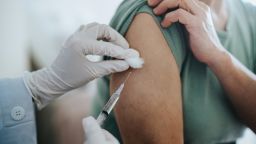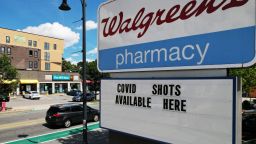Like many people across the US who’ve gone to a pharmacy in the hopes of getting one of the newly updated Covid-19 vaccines, Cynthia Cox walked away disappointed, but it wasn’t for lack of trying.
Cox happens to be an insurance expert. At the nonprofit health policy think tank KFF. she specializes in knowing the ins and outs of the Affordable Care Act, which mandates insurance coverage for preventive services including vaccines.
“I study health care costs and access to care, particularly for people with private insurance,” said Cox, who lives in Washington. “And I still couldn’t work the system.”

She’s hardly alone.?Thousands of people have had Covid-19 vaccine claims rejected each day since the new shots got the green light on September 12, according to a letter that Health and Human Services Secretary Xavier Becerra sent to health insurers on Friday.?He reminded the insurers of their legal obligations to cover vaccinations — in most cases, with no costs passed on to plan members — and urged them to find solutions to the coverage issues.
“We want to underscore the public health importance of reducing barriers to coverage however possible and urge you to consider any and all ways to reduce these barriers,” the letter says. “With claims rejections in the thousands each day, we are missing opportunities to save lives together.”
What is clear is that the vaccine rollout this go-round has been “needlessly rocky,” said Dr. John Grabenstein, director of scientific communications for Immunize.org, a nonprofit that works to increase vaccination rates.
There were “months to prepare. Was nobody doing quality control checks to make sure this wouldn’t happen?” he said.
Grabenstein said he’s not worried about people who are dedicated and well-resourced. Even if they have a delay of a week or so, they’ll be OK. What keeps him up at night are people who are at the margins or on the fence about the need for the vaccines.
“The more friction there is in the system, the more frustration there is in the system,” Grabenstein said, “people don’t get vaccinated.”
Confusion about coverage
Cox belongs to an HMO, and her plan requires her to stay in the provider network for most services. Last week, she went to the insurer’s website to see if she could make an appointment to get one of the new Covid-19 vaccines, which has been updated to help the body fight off the latest coronavirus variants. Cox said her employer’s code of ethics doesn’t permit her to name her insurer.
“Not only were there no appointments available, but they had actually disabled that part of their website at the time that I was trying to sign up,” she said.
It’s not clear why the company wasn’t ready to sign people up to be vaccinated, Cox said. But some insurers have said that under the federal CARES Act, which was passed in 2020, they believed they had 15 business days to add the new vaccines to their plans.
In 2021, the US Department of Labor issued a subsequent ruling that said the 15-day window for coverage had been satisfied after the 2020 approval of the first Covid-19 vaccines.
In his letter last week, Becerra reiterated that this year’s updated Covid vaccines should have been covered as soon as they were approved by the US Food and Drug Administration on September 11.
Normally, Cox might have just waited for her health plan to catch up, but she’s traveling soon and didn’t want to risk getting really sick on the road.
She knew that under the law, her health insurer had to pay for the vaccine out-of-network if it wasn’t offering it in-network. So she made an appointment at her local Walgreens.
“I figured I would show up and that I’d probably have to pay approximately $200 out of pocket, but then I could try to get that reimbursed by my insurer later,” she said.
But workers at the Walgreens she went to said they wouldn’t let her pay the full cost of the vaccine.?Rather, they had to bill it through her insurance — and they weren’t even equipped to accept self-payments.
Cox said that really surprised her. “I was prepared that I might have to pay the full cost and be reimbursed later. I wasn’t prepared for the fact that some pharmacies weren’t set up to take cash payments,” she said.
A spokesperson for Walgreens said that the company can’t comment on one person’s experience but that it is committed to making sure everyone gets vaccinated at no cost out-of-pocket.
“Our pharmacists are aware of the procedures to process insurance claims and can assist those who have questions. We encourage everyone to bring insurance information to their appointment if available but will not turn away those whose insurance does not cover it,” the company said in a statement.
Walgreens is one of the retail pharmacies, along with CVS and a company called eTrueNorth, participating in the federal Bridge Access Program, which provides free Covid-19 vaccines to those who don’t have insurance or who have plans that don’t cover vaccines. Local health departments and federally qualified health centers are also participating.
Cox said she was impressed with how hard the pharmacy staff tried to assist her.
“The Walgreens employees were, I think, trying to be very helpful and really did try to get my insurance company to go along with this,” she said, spending almost an hour on the phone.
Then, a representative for her insurance company told her she needed to track down the fax number for her doctor’s office so they could send a prior authorization form.
She finally got the number and called the insurance company back. But this time around, the representative had no idea what she was talking about or why a prior authorization might be needed.
“He told me ‘no, you just have to wait for it to be in-network,’ ” she said.
Roadblocks and red tape
The next day, Cox went to her human resources representative at work, the person who can help employees when they run into coverage issues with their health plan. Together, they pointed to the HHS regulations that require coverage of services, like vaccines, if the plan wasn’t offering it in-network.
Her insurer agreed that yes, she should be able to get the vaccine outside of the network.
So the day after, she went back to Walgreens, which she says was the only place she could get an appointment.
“Walgreens tried to run it through my insurance again, and it was denied automatically in their system,” Cox said. “So I asked them to call my insurer. They called, and the person phone also denied it.”
Meanwhile, her HMO finally began scheduling appointments for the Covid-19 vaccine.
But there’s another catch: None of the appointments were available in the D.C. metro area, where she lives.
“I would have to go to a different metro area like Baltimore or Fredericksburg or places that are about an hour drive or more away,” she said.
On Wednesday, in a response to Becerra’s letter, national organizations that represent private insurers — America’s Health Insurance Plans, the Blue Cross Blue Shield Association, the Alliance of Community Health Plans and the Association for Community Affiliated Plans — said that any widespread technical issued had been fixed.
“At this time, we understand that systemic technical issues have been largely, if not completely, resolved and are not limiting patient access to vaccines,” the groups said in a letter. “Should further issues arise, we stand ready to swiftly implement system improvements.”
Get CNN Health's weekly newsletter
- Sign up here to get The Results Are In with Dr. Sanjay Gupta every Friday from the CNN Health team.
The insurers also said they were reaching out to plan members who had experienced denials and other problems getting vaccines in the early days of the rollout.
“Health plans are proactively contacting members and connecting them to in-network providers with available no-cost sharing COVID vaccine,” the letter says.
In a statement issued after a meeting between HHS and insurers on Wednesday, the administration said 6 million vaccine doses have been shipped to pharmacies, and 2 million people have gotten the shots.
After working on the issue for a week, Cox said Wednesday that she was finally able to get her Covid-19 vaccine but had to drive an hour each way to reach in-network providers who had it.
Cox has been tweeting about her vaccination saga and quickly learned that she is not alone. She’s heard from others who have HMOs that they were also getting stymied by the in-network coverage requirement, even though they shouldn’t be. She knows that she’s lucky to be able to pay for a vaccine out-of-pocket and to drive long distances to get it.
She also heard from people who had tried to pay out-of-pocket at Walgreens but were turned away, like she was.
“I hope this doesn’t deter people from getting recommended vaccines,” Cox said. “I think that this is something that should hopefully be temporary.”



